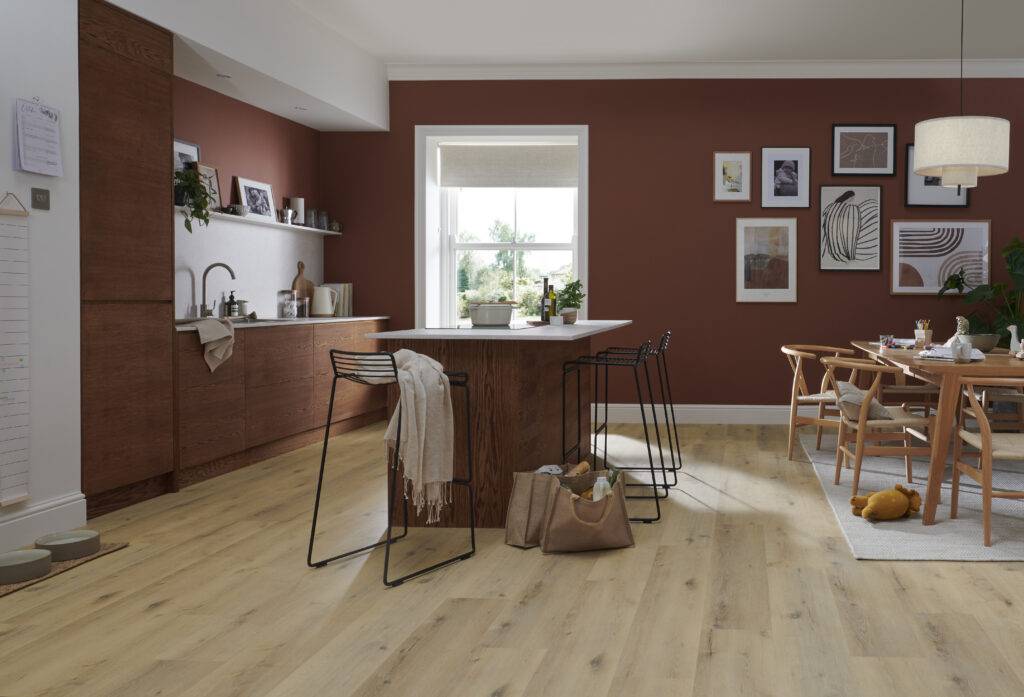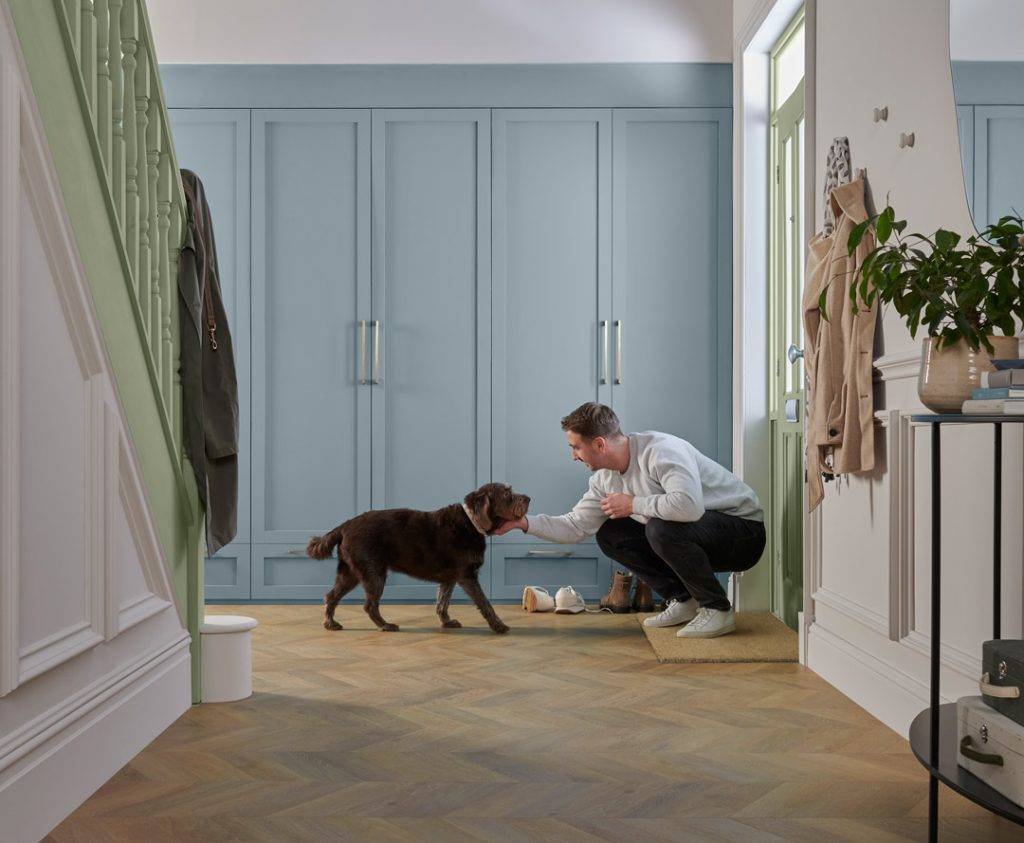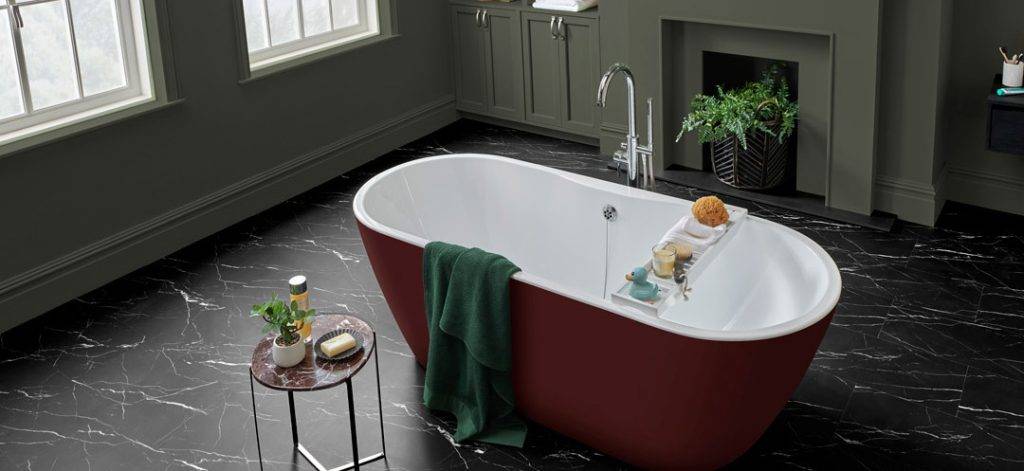Building homes from the floor up
Up to 3 FREE Samples
Building homes from the floor up
Up to 3 FREE Samples
Your stairs are one of the key places in your house that bears the brunt of foot traffic, and considering the weight distribution of climbing your stairs, it has to deal with a lot of stress over its lifetime. Not only does good flooring increase the stability and durability of your stairs, but the right flooring can make it stand out and look beautiful to boot.
That brings us to the topic – what is the best flooring for stairs? The following is a breakdown of the different types of flooring options you can opt for, how they compare to others, and ultimately what comes out on top.
We’ll begin covering several factors that are highly advantageous for new flooring on stairs:
Safety – Having safe stairs is paramount to protect yourself, your guests and your family. Slip resistance through textured surfaces, non-slip coating and even stair nosing goes a long way in ensuring balance is never compromised.
Durability – Stairs are a high-traffic area, so having a hallway floor and stair flooring that is durable enough to withstand impacts, scuffs, wear and tear, and scratches, will ensure your stairs remain stable and look new for years to come.
Appearance – Your stairs are one of the most central features of your home, often becoming the focal point of a hallway. As a result, their appearance matters. Style and colour of the flooring you choose can help you with expressing your style in a way that is meaningful to you.
Maintenance – This, in our eyes, should be a mandatory concern for all homeowners. Having a floor that is easily maintained means your floor is clean and safe, and it also looks spectacular with ease.
Cost – When it comes to the cost of home improvements, we believe the number one concern should be value. There is a sweet spot between how the floor looks and functions, and the costs involved such as installation, underlayments, potential replacement/repairs over time etc. Finding a quality product for a competitive price is paramount to getting a good deal.
What is the best flooring for stairs?
Below we’ll explore various flooring options for stairs to see how well they would perform in real world scenarios. As flooring experts, we know the needs of UK customers and below we’ll consider how different flooring might perform on stairs, so you can consider their key pros and cons and decide if they’re right for you.
Carpet
Carpet is a warm and soft fabric, and high-end luxury carpets are some of the most comfortable in the entire flooring market. They typically offer great noise reduction through cushioning with a suitable underlay, which would be useful on creaky stairs. Finally, carpets come in a wide range of styles, patterns and even material make-up, so it’s a flooring option you can really customise to suit your exact tastes and requirements.
That being said, we feel they are a hard sell for flooring on stairs. They are quite hard to clean thoroughly, and allergens can become trapped in the fabric over time. You have to sacrifice some comfort, too, as a carpet that is too plush will degrade under heavy foot traffic. If you do opt for a carpet, ensure the pile is tight or reasonably short to avoid movement under foot, as this may create slip issues.
Hardwood
Wood flooring gives off a classic beauty that many flooring options that incorporate printing inevitably try to emulate. On top of this, wood floors usually add value to a home, and its potential for refinishing means you can change the look over time as your tastes change. On stairs, hardwood can give a sleek and modern feel.
One issue with real wood flooring is that it can be notoriously expensive. It can also scratch easily and takes longer than most other floors to install on stairs. Wood can also prove to be a pretty noisy flooring option for your stairs, which can be a nuisance to others in the house.
Laminate
Laminate is a budget-friendly option that mimics the look of wood. It’s also fairly durable, meaning you can ensure your stairs will remain healthy throughout its longevity. Laminate on stairs may be less common than in living rooms or hallways, but they do offer a cheaper way of achieving the impressive look of wooden stairs, without the higher costs.
That being said, laminate also mimics wood’s cons in a lot of areas. It can be quite noisy to use and can be limited in other ways too, meaning another flooring option for your stairs may be a better choice.
Tile (Ceramic, Porcelain, Stone)
We felt it’s only fair to mention these types of flooring, although they are not prominent on stairs at all in the UK. Those interested in creating a Mediterranean feel in their home might benefit from these flooring options for your stairs, however.
Tile flooring is extremely durable, and it’s beyond reason to suggest any damage would come to them through foot traffic. They come in a wide range of styles and are also highly water resistant, so there’s no need to worry if you spill a cuppa on your way upstairs – a quick wipe away will prevent any mess or accidents.
Installation on stairs would also be complicated, taking a good deal of time to cut and fit the tiles to the depth of your stairs, and any grout discoloration that comes naturally from use will be not be easy to clean.
Luxury Vinyl Tile (LVT)
Luxury Vinyl Flooring are flooring options that are soft, and comfortable, but also very durable. Its material makeup allows it to resist compression from foot traffic, making it an excellent choice for stairs.
LVT is very easy to maintain, with Luvanto’s Floor Care Kit ensuring a coat that not only enhances its looks, but further protects its top layer, and adds anti-slip properties to the floor – perfect for stairs. LV tiles come with the most variety in both looks and additional features out of any flooring, such as Rigid Core products that emulate the feel of wood, options such as Luvanto Endure that gives it a massive boost to durability and resistance, and many LVT products boast heavy non-slip properties.
Luxury Vinyl Flooring does have cons, of course. For one, it requires your sub-floors to have near-perfect levelling, which is easy enough to achieve with stairs. We also recommend that you have a mind for quality control when searching for your product, as lesser quality options can be lacking in some areas – work with Luvanto to find your perfect LVT flooring option for your stairs.
Our recommendation for the Best Stair Flooring Choice
Overall, we believe that the best stair flooring depends on the level of care your new stairs are shown. It’s our recommendation that the best flooring for stairs is by far and away LVT flooring.
By focusing on the key points we made earlier about the best things to look out for in your flooring for stairs, let’s see how LVT performs:
Safety – Some variants of Luxury Vinyl Tile come with high anti-slip resistance built in, but even outside of those products a floor care kit can add those resistances. Even if you didn’t, LVT is not a very slippery flooring type in comparison to most floors. LVT flooring from Luvanto is also waterproof, ensuring that the liquid doesn’t soak into the floor, but also making it easy to clear up. If you opt for stair-nosing, then it’s pretty hard to believe that there’d ever be an accident with this flooring type on your stairs.
Durability and Maintenance – LVT has many resistances that other floors lack. Its wear layer adds a high level of scratch resistance, ensuring even rowdy homes can have these floors on the stairs without so much of a mark. If any tile were to be damaged for any reason, you’d need only replace that one tile, and installing/uninstalling is very easy.
Highly Versatile – LVT’s wide selection of design choice styles means that you never have to go without a complementary design for your stairs. LVT mimics most flooring options to a highly realistic standard, so you achieve whatever look you want when you opt for LVT stairs.
Comfort – One of the best things about LVT is how comfortable it is. Despite technically being a hard floor, it rivals many carpets in how comfortable it can be, and when installed on the stairs, it will cushion a good deal of noise.
Cost-Effectiveness – LVT is an affordable budget-smart choice for all your flooring needs. It delivers premium looks and performance without the high cost of wood or stone, and its longevity ensures that they cost much less overall because you won’t need to replace the flooring on your stairs as often as you would if you’d opted for a cheaper carpet option, for example. Furthermore, their compatibility with elements such as underfloor heating makes it a fantastic choice.
Conclusion
Overall, the stair flooring you prefer will differ from person to person, but for those without biases or pre-existing plans, having LVT on your stairs will make for a beautiful and worthwhile investment that will really allow you to express your own style for your home.
Recently Viewed
Related Articles
The Natural LVT flooring trend: Bring the Outdoors in
Crafting Industrial Style: Decorating with Stone Effect LVT Flooring from Luvanto
How to Style Dark Flooring
How to Style Herringbone Flooring
Understanding LVT Specifications and Technical Details: Your Guide to a Perfect Floor
Waterproof LVT for High-Moisture Bathrooms
Clay Earth
Midnight Olive
Coastal Cottage




Trends come and go but a Luvanto floor is forever.
Keep your interiors looking show-home worthy with our colour and trend inspiration. As experts in colour forecasting and pairings, we match the latest trends and colours with each of our flooring shades so you can stay tickled pink with your décor all year round.
Flooring
Inspiration
Where To Buy
Help And Support
Copyright © 2024 Luvanto - QA Flooring Solutions Ltd. All Rights Reserved.
QA Flooring Solutions Ltd is a company registered in England
Registered Office: Unit 2 Hurricane Drive, Speke, Liverpool, L24 8RL
Company Registration Number: 07870268 | VAT Number: 852026449
| Cookie | Duration | Description |
|---|---|---|
| cookielawinfo-checkbox-analytics | 11 months | This cookie is set by GDPR Cookie Consent plugin. The cookie is used to store the user consent for the cookies in the category "Analytics". |
| cookielawinfo-checkbox-functional | 11 months | The cookie is set by GDPR cookie consent to record the user consent for the cookies in the category "Functional". |
| cookielawinfo-checkbox-necessary | 11 months | This cookie is set by GDPR Cookie Consent plugin. The cookies is used to store the user consent for the cookies in the category "Necessary". |
| cookielawinfo-checkbox-others | 11 months | This cookie is set by GDPR Cookie Consent plugin. The cookie is used to store the user consent for the cookies in the category "Other. |
| cookielawinfo-checkbox-performance | 11 months | This cookie is set by GDPR Cookie Consent plugin. The cookie is used to store the user consent for the cookies in the category "Performance". |
| viewed_cookie_policy | 11 months | The cookie is set by the GDPR Cookie Consent plugin and is used to store whether or not user has consented to the use of cookies. It does not store any personal data. |
Building homes from the floor up
Up to 3 FREE Samples